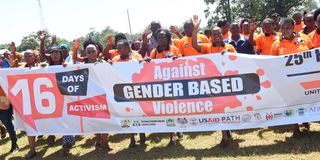Implement Kenya’s ‘beautiful’ laws to curb gender-based violence

Kakamega women, led by Governor Fernandes Barasa’s wife Janet, march in Mumias during the launch of 16 Days of Activism against GBV on November 25, 2022.
This year’s 16 Days of Activism against Gender-Based Violence (November 25-December 10) is of special significance. It coincides with the Preventing Sexual Violence in Conflict Initiative (PSVI) conference — a UK Foreign and Commonwealth Office (FCO) project — that just ended in London.
While 16 Days of Activism is a predictable annual event, the first-ever PSVI gathering was held in November 2014 in London with a view to a 2019 follow-up, which aborted ostensibly due to that year’s general election.
However, a January 2020 joint review of the PSVI reads a little more into the failed meeting, blaming it on the short shrift matters gender tends to receive. Titled “The UK’s Preventing Sexual Violence in Conflict Initiative: Joint Review”, the report takes a sober look at the earlier summit that promised a lot but grossly under-delivered.
Just like its predecessor, the November 28-29 conference had high-profile inputs, including that of UN Deputy Secretary-General Amina Mohammed of Nigeria, and the Special Representative to the UN Secretary-General Pramila Patten of Mauritius. The former spoke at a pre-conference reception in early November, where she pitched the meeting’s significance while Ms Patten chaired a panel discussion that included Mr Noordin Haji, Kenya’s Director of Public Prosecutions.
Conflict
Giving what he called his personal opinion on the DPP’s contribution that earned him high accolades at the panel discussion, Fr Innocent Maganya noted that while Kenya has progressive laws [to address and prevent SGBV], “implementation is always an issue”. Mr Haji addressed sexual violence against women and girls by police during general elections.
Perhaps next time Mr Haji addresses such a forum, he will go beyond citing the beautiful pieces of legislation addressing SGBV and report concrete action against perpetrators past of violence against women and girls in situations of conflict.
Fr Maganya, who attended the meeting as director of the Institute for Interreligious Dialogue and Islamic Studies at Tangaza University College in Lang’ata, Nairobi, is not alone in his reservations about the disconnect between intention and implementation. In a 2016 publication, titled I Just Sit and Wait to Die: Reparations for Survivors of Kenya’s 2007-2008 Post-Election Sexual Violence, Human Rights Watch documents the voices of women who [still] await reparation for the violence they suffered.
The import of the London conference is that the tribulations women and girls suffer in situations of conflict are not only experienced in Kenya. During the meeting, Fr Maganya, who is from the Democratic Republic of Congo (DRC), shared with this writer a session where his compatriot recited a poem dedicated to a son she described as “a fruit of rape”.
The woman was one of the 50 survivors of sexual violence in situations of conflict—election violence even on women candidates included. Sexual violence is active in 18 conflicts in the world delegates heard.
Addressing the panel, Ms Patten, who had been on a mission in South Sudan in October, shared a harrowing video on survivors of violence.
“In Juba and Yambio,” she said, “I met young mothers recently released from the grip of armed groups along with their children born of rape”, whom, she said, were suffering from mental health complications. The women shared with her what she described as “unimaginable cruelty they have suffered only to be shamed and shunned by their families and communities upon release.”
They told her about the physical, psychological, economic, cultural and legal risks and harm their children are exposed to without birth certificates, access to education or health. The survivors, she added, required urgent attention in form of medical and psychological support. Leaning on her first-hand encounter with the survivors of violence, she stressed what needs to be done: multi-sectoral support for the victims of violence.
Calling on UN Member States and donors to allocate sustained funding for intervention in conflict-related sexual violence, Ms Patten added that the children’s fate was “inextricably linked to their mothers” as they suffer as a result of their mothers’ stigmatisation, social exclusion and discrimination.
Hopefully, the rise in participation from 113 to 156 UN member states adds value to the talks advancing the debate from a mere talk shop to tangible benefits for survivors.
Ms Kweyu is a consulting editor at The Editorial Centre. [email protected]





